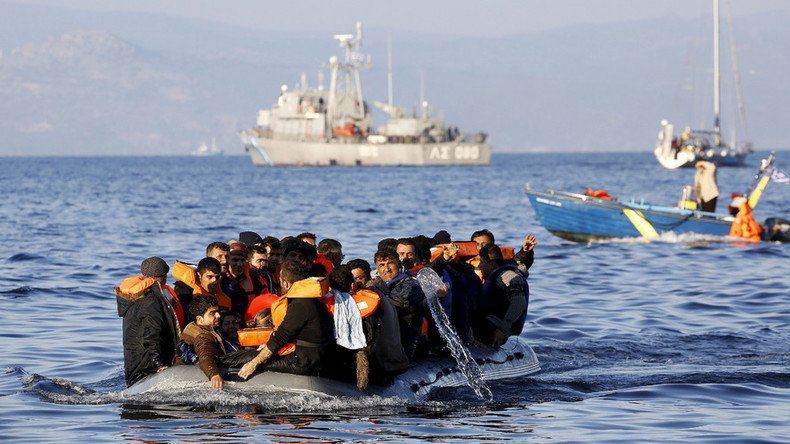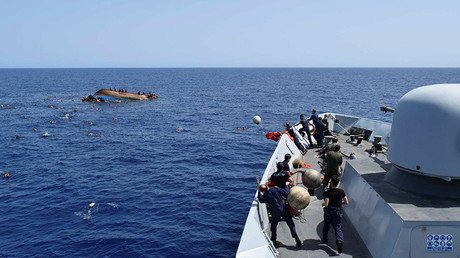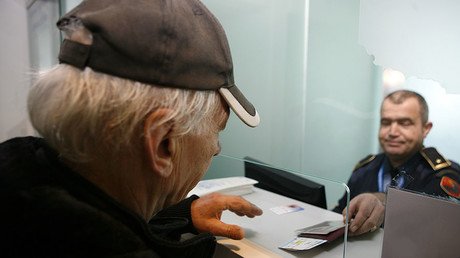‘No ticket to Europe’: Send refugees back home or settle them on islands, says Austrian FM

Refugees trying to cross the Mediterranean to reach European shores have to be sent back or re-settled on islands, Austria’s Foreign Minister has said, adding that being rescued from a boat in distress should be “no ticket to Europe.”
Austrian Foreign Minister Sebastian Kurz told Die Presse newspaper in an interview on Saturday that Europe must take a tougher stance on refugees, arguing that the current migrant policy must be scrapped if the EU is to avoid being destroyed.
Refugees who are rescued from boats in the Mediterranean “must be returned immediately, ideally to their country of origin,” Kurz said, adding that he thought it could be possible to reach an agreement with Libya’s emerging government to stop refugees from leaving for the EU from the Libyan coast.
“If this kind of cooperation is not possible, then people have to be housed and cared for at an asylum center, most likely on an island. Their return and financial support must be organized there.”
While this policy might sound tough, the concept of settling arriving migrants on remote islands before allowing them onto the mainland is not new. Throughout history, the US and Australia have made use of this scheme. Ellis Island, located in Upper New York Bay, served as the gateway for over 12 million immigrants arriving in the United States and was the nation’s busiest immigrant inspection station from 1892 until 1954.
Asked whether the Greek island of Lesbos could become the European “Ellis Island,” Kurz replied: “Whoever needs to stay on an island like Lesbos and has no chance of asylum being granted would be more willing to return [home] voluntarily, than someone who has moved into a flat in Vienna or Berlin.”
Last week 2nd deadliest ever for #missingmigrants. 1,083 feared dead. Approx 500 killed in worst incident off #Libyapic.twitter.com/8CklJSpYtl
— Jon Williams (@WilliamsJon) 2 июня 2016 г.
Kurz added that Europe’s refugee policy should be modeled after Australia’s. Between 2012 and 2013, a total of nearly 40,000 people came to Australia by boat. In response, the Australian Navy launched a controversial Border Patrol operation that returned migrants to their countries of origin or took them to immigration centers in the nearby countries of Nauru and Papua New Guinea.
Many of them still remain locked up there to this day, with no chance of applying for asylum in Australia.
205,509 migrants incl refugees arrived by sea to Europe 2,443 dead/missing #MigrationEuropehttps://t.co/nVsTPW6SYipic.twitter.com/Z2w5BHymfF
— IOM (@IOM_news) 3 июня 2016 г.
“The EU should clearly state – whoever tries to get to Europe illegally, loses their right to asylum here. Second, we must make sure that rescue from distress has nothing to do with a ticket to Central Europe.”
The hardline refugee policy might be compensated for by providing “much more help locally,” Kurz claimed, while suggesting that a resettlement program could be another solution.
“We have already taken people under resettlement programs directly from Syria: women, the wounded, sick and weak people… Australia, Canada and the UK bring thousands of refugees directly from war zones; please do not take it as fiction.”
According to Kurz, “some politicians in Central Europe believe they can make the majority of European laws because they feel morally superior,” an apparent reference to German Chancellor Angela Merkel, who has repeatedly insisted that the migrant crisis is manageable.
“But you have to understand that, given the mood of the population, that taking countless refugees would be a tough challenge for many countries not only in Eastern Europe,” the Austrian minister asserted.
Media has reported that a growing number of refugees have been using sea lanes to get to Europe since the so-called Balkan route, a major passageway for migrants stretching between Turkey and Central Europe, was closed. According to the UN’s International Organization for Migration Refugee Agency (IOM), an estimated 206,000 people have already crossed the Mediterranean to reach European shores in 2016.














